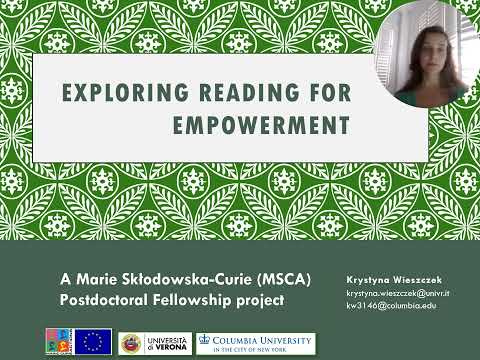 Speaker: Krystyna Wieszczek @Krystyna.Wieszczek
Speaker: Krystyna Wieszczek @Krystyna.Wieszczek
 Affiliation: University of Verona and Columbia University
Affiliation: University of Verona and Columbia University
Title: Exploring Reading for Empowerment
Abstract (long version below): Interdisciplinary studies are examining diverse prosocial effects of reading literature. This paper explores a project that sets out to develop a tool to measure if literary reading can help enhance the sense of empowerment in disadvantaged young adults to help counteract their environment’s disempowering influences on their lives. The project seeks to test it in controlled experiments with diverse participants in New York and in Italy using an ‘empowerment canon’ of literary works selected by experts.

 Long abstract
Long abstract
Interdisciplinary studies are examining diverse prosocial effects of literary reading. Empirical studies have shown that shared reading and encouraging mental processes (re-appraisal, meta-cognition) resulted e.g. in lower scores for dementia or depression symptoms.1 They confirm that literary reading can promote a greater social cognition and empathy2 that can extend to members of other backgrounds and cultures.3 They also show that it can stimulate modifications in worldview and greater self-reflection and self-understanding, helping create an openness to self-alteration and personality trait modification.4 The observed enhancement of the capacity for reflection and social cognition may suggest literature’s potential to also foster empowerment, but research has yet to confirm it, as this potential effect of reading is understudied. Indeed, a literature review commissioned by the UK charity Reading Agency points out to a lack of reliable studies on reading for pleasure and empowerment and the need for research in applied settings and studies with baseline and follow-up measures and control groups.5
The paper explores a project that sets out to develop an interdisciplinary tool to measure if reading literature may help enhance the sense of empowerment in disadvantaged young adults, possibly helping them improve their life choices, life satisfaction and wellbeing. Research into wellbeing points to the interconnectedness of various factors, including those often dictated by our choices, such as education, employment, housing, and health.6 Our relationships and the media, our augmented environment, have a big impact on our identity, beliefs and attitudes – and hence such life choices. Since the news, advertising, gaming, and social media industries often propel insecurity, social division, consumerism, and addictive behaviours and one’s environment may imbed limiting beliefs and conformism, mitigating such disempowering influences is a critical step.
The paper analyses how the project seeks to develop a cross-disciplinary mixed method methodology based on questionnaires and a semi-structured interview to detect potential change in external influence perception and the sense of empowerment. Empowerment is understood as an expansion of freedom of choice and action by increasing one’s authority and control over resources and decisions that affect one’s life. Building on approaches from literature and psychology (e.g., affective, cognitive, and behavioural rating scales, trait and state of empathy scales, and empowerment scales), the methodology intends to explore potential causal links with assigned reading in controlled reading experiments carried out in New York and Milan, Italy. It will use survey-based ex ante, ex post and follow-up evaluations to assess immediate effects and how sustained they are. A semi-structured interview with randomly selected participants from each country follows for triangulation and a greater exploration of potential causal links. Participants comprise young adults from disadvantaged backgrounds (determined by socio-economic indices of area deprivation, recruited in liaison with local welfare, cultural, educational, and sports organisations) and non-disadvantaged undergraduate students. The experiments will use an ‘empowerment canon’ of literary works and meaningful excerpts in prose selected by experts such as authors, critics, literary scholars, psychologists, educators, and other reading specialists that can be particularly useful for enhancing readers’ perception of such disempowering influences and fostering empowerment to counter their effects.
References
Philip Davis, Reading for Life (Oxford UP, 2020); Josie Billington et al., “A Comparative Study of Cognitive Behavioural Therapy and Shared Reading for Chronic Pain”, Medical Humanities (MH) 43.3 (2017): 155-165; Billington et al., “A Literature-Based Intervention for Older People Living with Dementia”, Perspectives in Public Health 133.3 (2013): 165-173; Christopher Dowrick et al., “Get into Reading as an Intervention for Common Mental Health Problems”, Mental Health 38.1 (2012): 15-20.
David Kidd, Martino Ongis and Emanuele Castano, “On Literary Fiction and Its Effects on Theory of Mind”, SSOL 6.1 (2016): 42-58; Michael Burke et al., “Empathy at the Confluence of Neuroscience and Empirical Literary Studies”, SSOL 6.1 (2016): 6-41.
J. Usherwood and B. Toyne, “The Value and Impact of Reading Imaginative Literature”, Journal of Librarianship & Information Science 34.1 (2002): 33-41
Thor Magnus Tangerås, Literature and Transformation (Anthem Press, 2020); W. Menninghaus et al., “Towards a Psychological Construct of Being Moved”, PLoS One 10.6 (2015); Don Kuiken and Shawn Douglas, “Living Metaphor as the Site of Bidirectional Literary Engagement”, SSOL 8.1 (2018): 47-76; Djikic, Oatley and Carland, “Genre or Artistic Merit?: The Effect of Literature on Personality”, SSOL 2.1 (2012), 25-36.
The Reading Agency, Literature Review: The Impact of Reading for Pleasure and Empowerment (2015).
HM Treasury, Wellbeing: Supplementary Green Book Guidance (2021).

